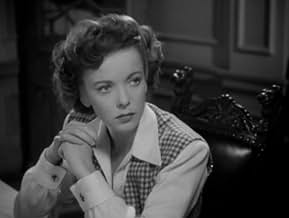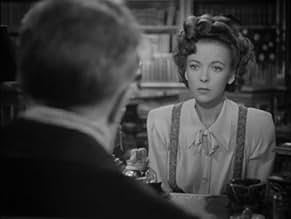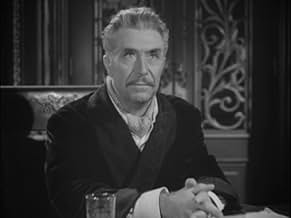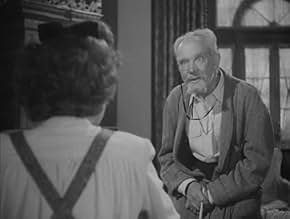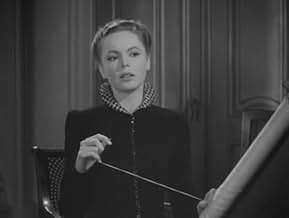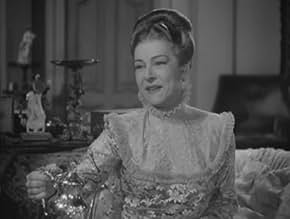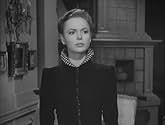A young woman traveling to Poland with her employer meets a count, and they fall in love as World War II begins.A young woman traveling to Poland with her employer meets a count, and they fall in love as World War II begins.A young woman traveling to Poland with her employer meets a count, and they fall in love as World War II begins.
Alla Nazimova
- Zofia Orwid
- (as Nazimova)
Harry Adams
- Ballet Attendee
- (uncredited)
Alex Akimoff
- Wine Seller
- (uncredited)
Sylvia Arslan
- Naneczka
- (uncredited)
Lynn Baggett
- Friend of Count Orvid
- (uncredited)
George Blagoi
- Polish Peasant
- (uncredited)
John Bleifer
- Wladek
- (uncredited)
Paul Bradley
- Ballet Attendee
- (uncredited)
Cyd Charisse
- Ballerina
- (uncredited)
Gino Corrado
- Peasant at Party
- (uncredited)
- …
Julius Cramer
- Polish Diplomat
- (uncredited)
Jane Crowley
- Party Guest
- (uncredited)
- Director
- Writers
- All cast & crew
- Production, box office & more at IMDbPro
Featured reviews
A bit slow moving but nonetheless interesting. The only thing missing is Maria Ouspenskaya stirring a boiling cauldron.
Paul Henried and Ida Lupino fall in love near Warsaw. She's a British commoner employed by a fancy English antique collector. Paul and Ida meet by accident in an antique shop. After they do some innocent and tender kanoodling for a while, Paul decides to bring Ida home to meet the Fockers...oops...I mean the royal Orvid family.
Only philosophical uncle Leopold Baruta likes Ida. Paul's sister,Janina, hates her while the rest of the Orvids think she's not good enough for Paul. In the meantime, we encounter a guy who's supporting them all-- Count Pavel. The reason why he's a Count is because everyone watches him count his money to then disperse to them as monthly stipends.
Count Pavel is also a representative of Poland to Nazi Germany and he's convinced that, after Czechoslovakia, Hitler had no more territorial designs on Europe so it would be a good idea to give him the Polish Corridor so as not to tick him off into attacking Poland.
Ida begins to dislike the whole Orvid family and especially Paul's reliance on Pavel for dough. So she's about to hop a train to get her back to England when Paul promises to become independent and she buys into it. So they marry, start teaching the peasants how to till the land while Pavel seethes because this is no way for Polish nobility to act.
On Sept,1.1939, the Nazis invade Poland and begin bombing Warsaw. Paul puts on his military uniform and heads for battle. Ida is left home and somehow, she rallies the peasants into fighting the Germans which history proves to be an absurdity. She teaches them the "scorched earth" policy which history teaches was anachronistic because it was the Russians who employed it against the Nazis after 6/22/41.
However despite its flaws,it all makes for an interesting anti-Nazi, morale boosting film for us at home.
Paul Henried and Ida Lupino fall in love near Warsaw. She's a British commoner employed by a fancy English antique collector. Paul and Ida meet by accident in an antique shop. After they do some innocent and tender kanoodling for a while, Paul decides to bring Ida home to meet the Fockers...oops...I mean the royal Orvid family.
Only philosophical uncle Leopold Baruta likes Ida. Paul's sister,Janina, hates her while the rest of the Orvids think she's not good enough for Paul. In the meantime, we encounter a guy who's supporting them all-- Count Pavel. The reason why he's a Count is because everyone watches him count his money to then disperse to them as monthly stipends.
Count Pavel is also a representative of Poland to Nazi Germany and he's convinced that, after Czechoslovakia, Hitler had no more territorial designs on Europe so it would be a good idea to give him the Polish Corridor so as not to tick him off into attacking Poland.
Ida begins to dislike the whole Orvid family and especially Paul's reliance on Pavel for dough. So she's about to hop a train to get her back to England when Paul promises to become independent and she buys into it. So they marry, start teaching the peasants how to till the land while Pavel seethes because this is no way for Polish nobility to act.
On Sept,1.1939, the Nazis invade Poland and begin bombing Warsaw. Paul puts on his military uniform and heads for battle. Ida is left home and somehow, she rallies the peasants into fighting the Germans which history proves to be an absurdity. She teaches them the "scorched earth" policy which history teaches was anachronistic because it was the Russians who employed it against the Nazis after 6/22/41.
However despite its flaws,it all makes for an interesting anti-Nazi, morale boosting film for us at home.
In Our Time English girl Ida Lupino goes traveling with a somewhat subdued
Mary Boland and meets up with a real honest to goodness count played by
Paul Henreid. It's a romance that develops between them and she becomes a
countess.
Henreid is the kind of guy rich girls married back in the day for the title. He has an estate that's tied up in debt. They have to modernize or go broke. But with war clouds on the horizon will they have a chance?
This film is a tribute to the resistance of the Polish people in much the same way Edge Of Darkness is to the Norwegians. It came to the attention of the House Un-American Activities Committee and its writer Hpward Koch made the blacklist.
When Ida Lupino talks about having the estate peasants share in the harvest and maybe bringing in tractors she runs into some bad reaction from Victor Francen the old mastodon head of the family. God made him an aristocrat and them peasants and as an aristorat he's entitled to the perks therein. All this talk about sharing and brotherhood got the HUAC investigators attention.
In the end there's a note of optimism as this film came out in 1944 and the tide of war had turned and the audience who saw In Our Time knew it. The collective cast members fates are left to your imagination.
This wartime film still holds up well even today as recent events show fasciam is very much alive in this world and in places Americans did not contemplate in 1944.
Henreid is the kind of guy rich girls married back in the day for the title. He has an estate that's tied up in debt. They have to modernize or go broke. But with war clouds on the horizon will they have a chance?
This film is a tribute to the resistance of the Polish people in much the same way Edge Of Darkness is to the Norwegians. It came to the attention of the House Un-American Activities Committee and its writer Hpward Koch made the blacklist.
When Ida Lupino talks about having the estate peasants share in the harvest and maybe bringing in tractors she runs into some bad reaction from Victor Francen the old mastodon head of the family. God made him an aristocrat and them peasants and as an aristorat he's entitled to the perks therein. All this talk about sharing and brotherhood got the HUAC investigators attention.
In the end there's a note of optimism as this film came out in 1944 and the tide of war had turned and the audience who saw In Our Time knew it. The collective cast members fates are left to your imagination.
This wartime film still holds up well even today as recent events show fasciam is very much alive in this world and in places Americans did not contemplate in 1944.
It is unusual to see a film made during the Second World War by Warner Bros. that deals with Poland, but here we have this seldom seen gem starring Ida Lupina and Paul Henreid. Lupino plays an English tourist in Warsaw on an antique buying mission when she falls in love with a Polish count, played sensitively by Henreid. They move to his estate and attempt to modernize the farm operations, but the German invasion of Poland throws their lives into turmoil.
Very enjoyable indeed. I always enjoyed the stoic acting of Paul Henreid anyway and to see the very attractive and talented Ida Lupino at age 26 was a treat.
The important idea of a beau, either male or female, not being good enough for the family into which he or she's becoming a part of through marriage, is ancient. I know that here in the USA, it reigns galore but of course from studying history, I had learned that the "quality" of the beau in aristocratic Europe families was intense. Like for instance, here in the USA, family crests and all that jazz are meaningless but not so in Europe. There, lineage, pomp and ceremony are of supreme importance.
This is why Ida Lupino's entrance into the family of Count Orvid's of Poland is fascinating. It was like pitting the old Brooklyn Dodgers against the mighty New York Yankees in so many World Series games. Obviously in the film, Dodger Lupino didn't stand a chance except for uncle Leopold Baruta's warm understanding of why aristocracy shouldn't destroy love.
In the meantime, this enchanting love story is set in the backdrop of maniac Hitler's preparations for invading Poland. The film therefore has tension cleverly wound within the fabric of the entire film. And what will happen to the love affair and marriage of Ida and Paul once Hitler attacks? See for yourself--it's a good movie on Turner Classics.
The important idea of a beau, either male or female, not being good enough for the family into which he or she's becoming a part of through marriage, is ancient. I know that here in the USA, it reigns galore but of course from studying history, I had learned that the "quality" of the beau in aristocratic Europe families was intense. Like for instance, here in the USA, family crests and all that jazz are meaningless but not so in Europe. There, lineage, pomp and ceremony are of supreme importance.
This is why Ida Lupino's entrance into the family of Count Orvid's of Poland is fascinating. It was like pitting the old Brooklyn Dodgers against the mighty New York Yankees in so many World Series games. Obviously in the film, Dodger Lupino didn't stand a chance except for uncle Leopold Baruta's warm understanding of why aristocracy shouldn't destroy love.
In the meantime, this enchanting love story is set in the backdrop of maniac Hitler's preparations for invading Poland. The film therefore has tension cleverly wound within the fabric of the entire film. And what will happen to the love affair and marriage of Ida and Paul once Hitler attacks? See for yourself--it's a good movie on Turner Classics.
Vincent Sherman's "In Our Time" tries to do for Poland what "Mrs. Miniver" did for England: raise American awareness to the plight of a European nation besieged by the Nazis. Unfortunately, the film wanders all over the hack-writing map from romance to propaganda to social issues and loses its focus early on. Even the style of the film shifts from intimate drama to semi-documentary with voice-over narration to stirring morale booster complete with back-lit clouds and beams of inspirational light. Despite the varied styles, the movie seems to linger on far too long despite a running time of less than two hours. By the time that the requisite patriotic speech has been made, the music has risen to stirring proportions, and the march towards the sunset has begun, many viewers may already have tuned out.
The unconvincing story begins in an antique shop where Ida Lupino, the young companion of Mary Boland, an English antiques buyer, meets Paul Henreid, a Polish nobleman. Only those who have never seen a Hollywood film from the Golden Age will be surprised by the Romeo-and-Juliet romance that develops or by the obstacles that stand between the couple and eternal bliss. Class-conscious family, impending war, and stubborn peasants are only some of the roadblocks to those inspirational beams that beckon on the horizon.
Unfortunately, some first-class talent has been lavished on this less-than-classic film. Ida Lupino is the shy companion to an overbearing employer. Within two hours, she blossoms into an assertive woman who fully supports and inspires her husband in his idealistic pursuits. Paul Henreid, whose seductive eyes and voice won Bette Davis and Ingrid Bergman, works his magic on Lupino. Like his role in "Casablanca," Henreid's character is caught up in patriotic fervor and self-sacrifice. Both leads are excellent although they cannot overcome the messy script. Silent film star Alla Nazimova offers especially fine support as Henreid's aristocratic mother. However, while the cast often rises above the writing, "In Our Time" remains dated in its message. Considering what Poland endured under Communism after World War II, many of the film's inspirational lines about fighting for the future ring with irony. Despite the length, lapses, and inconsistencies, Lupino, Henreid, and Nazimova make "In Our Time" worth a viewing, but the film is hardly a repeatable experience.
The unconvincing story begins in an antique shop where Ida Lupino, the young companion of Mary Boland, an English antiques buyer, meets Paul Henreid, a Polish nobleman. Only those who have never seen a Hollywood film from the Golden Age will be surprised by the Romeo-and-Juliet romance that develops or by the obstacles that stand between the couple and eternal bliss. Class-conscious family, impending war, and stubborn peasants are only some of the roadblocks to those inspirational beams that beckon on the horizon.
Unfortunately, some first-class talent has been lavished on this less-than-classic film. Ida Lupino is the shy companion to an overbearing employer. Within two hours, she blossoms into an assertive woman who fully supports and inspires her husband in his idealistic pursuits. Paul Henreid, whose seductive eyes and voice won Bette Davis and Ingrid Bergman, works his magic on Lupino. Like his role in "Casablanca," Henreid's character is caught up in patriotic fervor and self-sacrifice. Both leads are excellent although they cannot overcome the messy script. Silent film star Alla Nazimova offers especially fine support as Henreid's aristocratic mother. However, while the cast often rises above the writing, "In Our Time" remains dated in its message. Considering what Poland endured under Communism after World War II, many of the film's inspirational lines about fighting for the future ring with irony. Despite the length, lapses, and inconsistencies, Lupino, Henreid, and Nazimova make "In Our Time" worth a viewing, but the film is hardly a repeatable experience.
Did you know
- TriviaCount Stefan takes Jennifer on a walking tour of Warsaw. As they walk, stock footage is shown of various important monuments, culminating in the bronze statue of Chopin by sculptor Waclaw Szymanowski. These monuments were all systematically destroyed by the Germans in 1940.
- GoofsAt the ballet, Count Stefan and others in his box use the opera glasses to look down at Jennifer in the audience below. The first shot through the glasses shows her not looking straight up at Count Stefan, but to her right, even though they have acknowledged each other. In subsequent shots through the glasses, the perspectives are far too low and to the front of Jennifer to be from the box above.
- Quotes
Count Pawel Orwid: [at the ballet] Stefan, when I was a young man, I came for the ballerinas. Later on I came for the music. Now I come to sit.
- Crazy creditsAfter the WB logo appears at the end, the letters W and B are separated and letters added to form the words "BUY War Bonds".
- ConnectionsFeatured in Frances Farmer Presents: In Our Time (1959)
- SoundtracksPolonaise in A major, Op.40, No.1 ('Military')
(1838-39) (uncredited)
Written by Frédéric Chopin
Partially played during the opening credits and at the end
Variation in the score throughout
Played on a radio to signal that Warsaw is still fighting
Details
- Runtime1 hour 50 minutes
- Color
- Aspect ratio
- 1.37 : 1
Contribute to this page
Suggest an edit or add missing content

